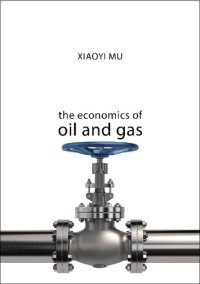
Ebook: The Economics of Oil and Gas
Author: Xiaoyi Mu
- Genre: Economy
- Series: The Economics of Big Business
- Year: 2019
- Publisher: Agenda Publishing
- City: Newcastle upon Thyne
- Language: English
- pdf
The availability of low-cost energy from fossil fuels in particular oil has been the driving force behind postwar global economic growth, such that the petroleum industry has some of the world’s largest state- and public-owned companies. In 2015, Exxon Mobil had revenues of $394 billion (more than the GDP of South Africa) and posted profits of $32 billion.
This book examines the economics of the entire value chain of the oil and gas industry, from exploration, development and production, to transportation, refining and marketing. At each stage, the key economic costs, considerations and appropriate business strategies are explored in order to provide the reader with a comprehensive understanding of the workings of the petroleum industry.
The book examines some of the unique economic challenges the industry faces, including negotiating international contracts with host countries (to gain access to hydrocarbons), managing the risks of recovery, implementing cross-border pipelines, dealing with huge variations in the taxation of refined products, and reacting to the effect of price control and subsidization in the OPEC nations which can create massive volatility in pricing. In addition, the search for low-carbon fuels, the impact of shale gas, the prospect of finite reserves, and the global political realities of the competing demands of oil importing and oil exporting countries make the sector high risk, but the economic rewards can be huge.
Throughout the book, the economic theory is presented in a form accessible to non-economists, and the needs of readers interested in energy policy as well as energy economics, are kept to the fore. The book is suitable for course use on programmes in energy economics, energy management, energy finance, petroleum law and energy policy, and will be welcomed by professionals working in government, industry and NGOs keen to understand the economics and business environment of oil and gas companies.
This book examines the economics of the entire value chain of the oil and gas industry, from exploration, development and production, to transportation, refining and marketing. At each stage, the key economic costs, considerations and appropriate business strategies are explored in order to provide the reader with a comprehensive understanding of the workings of the petroleum industry.
The book examines some of the unique economic challenges the industry faces, including negotiating international contracts with host countries (to gain access to hydrocarbons), managing the risks of recovery, implementing cross-border pipelines, dealing with huge variations in the taxation of refined products, and reacting to the effect of price control and subsidization in the OPEC nations which can create massive volatility in pricing. In addition, the search for low-carbon fuels, the impact of shale gas, the prospect of finite reserves, and the global political realities of the competing demands of oil importing and oil exporting countries make the sector high risk, but the economic rewards can be huge.
Throughout the book, the economic theory is presented in a form accessible to non-economists, and the needs of readers interested in energy policy as well as energy economics, are kept to the fore. The book is suitable for course use on programmes in energy economics, energy management, energy finance, petroleum law and energy policy, and will be welcomed by professionals working in government, industry and NGOs keen to understand the economics and business environment of oil and gas companies.
Download the book The Economics of Oil and Gas for free or read online
Continue reading on any device:

Last viewed books
Related books
{related-news}
Comments (0)